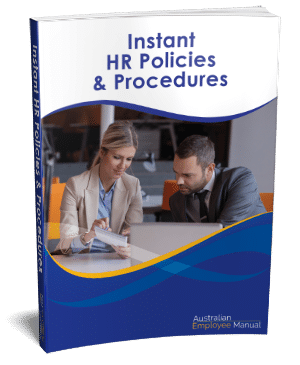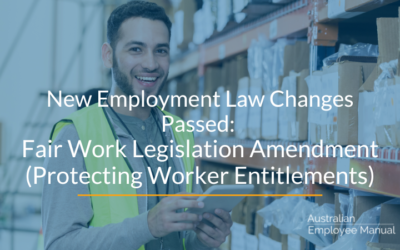With the cold and flu season in full swing, it pays to revisit requirements for medical certificates for absences.
When an employee can’t work because of illness or injury, or if they need to support a member of their immediate family or household who is sick or injured, they may be entitled to sick (also known as personal leave) or carer’s leave.
Entitlements to sick or carers leave are outlined out in the National Employment Standards under the Fair Work Act.
Essentially, all employees, other than casuals, are entitled to paid sick or carers leave. However, this entitlement does come with a few strings attached.
- Employees have the responsibility to let their employer know that they are taking sick or carers leave, and let them know how long they will be away for.
- Employers have the right to request evidence that the employee was legitimately absent from work because of illness or injury.
The Fair Work Legislative Provisions
Part 2.2 – The National Employment Standards – Division 7 Subdivision D—Notice and evidence requirements Sections 97 and 107
97 Taking paid personal/carer’s leave
An employee may take paid personal/carer’s leave if the leave is taken:
(a) because the employee is not fit for work because of a personal illness, or personal injury, affecting the employee; or
(b) to provide care or support to a member of the employee’s immediate family, or a member of the employee’s household, who requires care or support because of:
(i) a personal illness, or personal injury, affecting the member; or
(ii) an unexpected emergency affecting the member.
107 Evidence
(3) An employee who has given his or her employer notice of the taking of leave under this Division must, if required by the employer, give the employer evidence that would satisfy a reasonable person that:
(a) if it is paid personal/carer’s leave—the leave is taken for a reason specified in section 97; or
(b) if it is unpaid carer’s leave—the leave is taken for a permissible occasion in circumstances specified in subsection 103(1); or
(c) if it is compassionate leave—the leave is taken for a permissible occasion in circumstances specified in subsection 105(1).
What evidence is required?
The Fair Work Act outlines that employers can require an employee to provide evidence “that would satisfy a reasonable person.”
But what exactly does evidence of being sick or injured mean?
Option 1: Medical certificates issued by a medical practitioner
At its simplest, acceptable evidence means a medical certificate issued by a suitably qualified medical practitioner.
Medical Certificates are defined under the Fair Work Act as:
medical certificate means a certificate signed by a medical practitioner.
The Fair Work Act defines a medical practitioner as:
medical practitioner means a person registered, or licensed, as a medical practitioner under a law of a State or Territory that provides for the registration or licensing of medical practitioners.
While the Fair Work Act doesn’t outline specifically what is defined as a medical practitioner, the Australian Health Practitioner Regulation Agency does give some clues.
The term medical practitioner is what is known as a protected title, which means people calling themselves medical practitioners must be registered with the corresponding National Board (i.e. the Medical Board of Australia).
In other words, the only people considered true medical practitioners, when you chain all the bits of legislation together, are what are traditionally known as doctors.
The AMA has stringent guidelines on the issuing of medical certificates by doctors, including who can issue carer’s certificates (i.e. only the patient’s treating doctor).
Option 2: Statutory Declarations
Not everyone goes to the doctor for a cold or bout of food poisoning.
A Statuary Declaration (also known as a Stat Dec) is a written statement where someone declares that something is true, and signs it in the presence of an authorised witness. An employee can declare they were absent for a genuine reason using a statutory declaration.
There are legal penalties for making false declarations, which is why a signed statutory declaration from the employee that they were validly and legitimately ill or injured is also considered valid evidence for the purposes of the Act.
Option 3: Certificates from Other Health Professions
This is where it gets tricky. Under the old Workchoices Legislation that existed under the Howard Government, the Australian Fair Pay and Conditions Standard allowed for registered health practitioners and not just registered medical practitioners to be able to sign medical certificates for sick leave.
This was a much broader term under the legislation, and included pharmacists, osteopaths, chiropractors, dentists, nurses, occupational therapists, physiotherapists, podiatrists, psychologists, optometrists and even Chinese Medicine practitioners.
This extension was designed to reduce the burden on traditional medical practitioners and reduce the financial cost to the community through the Medicare system.
When the Fair Work Act replaced Workchoices, and the National Employment Standard replaced the Australian Fair Pay and Conditions Standard, the list of other acceptable professions who could issue medical certificates for sick leave purposes dropped off the legislative list even though the definitions of medical certificate and medical practitioner remained.
All the Fair Work Act says now is the employee needs to provide evidence that would satisfy a reasonable person.
What happens in practice is that health practitioners have continued to issue medical certificates to employees needing to claim sick or carers leave.
Some professions have embraced issuing medical certificates more than others. For example, the Pharmacy Guild provides a detailed guide to pharmacists to help them to determine whether or not issuing a medical certificate is warranted.
However, it is up to the employer as to whether or not to accept a sick leave or carers leave certificate from someone other than a medical practitioner as being reasonable considering all of the circumstances.
Things to take into account when deciding whether to accept a certificate from a registered health practitioner instead of a medical practitioner
In practical terms, it is very hard to refuse to accept a medical certificate for an employee issued by a registered health practitioner. Things to check:
- Is the certificate relating to the practitioner’s area of expertise?
- Is the health practitioner required to be registered or licensed? (Check out the Australian Health Practitioner Agency. You can search on the site that the practitioner listed on the certificate is currently registered).
- Does the certificate look genuine and original (not photocopied or altered)?
- Does the certificate provide details of the clinic including the name and address?
If the answer is yes, then generally the certificate will pass the reasonable person test and is acceptable evidence under the Fair Work Act.
That said, there have been cases before the courts where employers have successfully challenged the accuracy of medical certificates. These are the exception rather than the rule, and we recommend seeking advice from a legal specialist or HR consultant before heading down that path.
Last words
Whatever you decide, that your business’s sick leave policy and procedures should outline when medical certificates are required within your workplace. (Our Instant HR Policies and Procedures Manual has a clear sick leave policy to get you started).
Remember to apply your procedures consistently and fairly across your workforce, and don’t unilaterally refuse applications without taking all factors into consideration.




